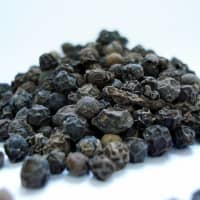Piperine is an alkaloid that can be extracted from black pepper.
Healing Properties
Cytoprotective
Piperine protects cells against harmful agents.[1]
Chemopreventive
Piperine demonstrates a chemoprotective effect by modulating lipid peroxidation and augmenting antioxidant defense system.[1:1]
Herbal & Drug Absorption Enhancer
Piperine can result in a 2-fold or greater increase in the oral bioavailability of drugs.[2]
- Piperine diminishs intestinal direct phase II metabolism which serves as an absorption obstacle for many of today’s marketed drugs.[2:1]
Disease / Symptom Treatment
Cancer
Resveratrol and piperine enhance radiosensitivity of tumor cells.[3]
Lung Cancer
Piperine effectively suppresses lung cancer.[1:2]
Study Type: Animal Study: In Vivo
Title: Cytoprotective effect of piperine against benzo[a]pyrene induced lung cancer with reference to lipid peroxidation and antioxidant system in Swiss albino mice
Author(s): K Selvendiran, J. Prince Vijeya Singh, K. Baba Krishnan, D Sakthisekaran
Institution(s): Department of Medical Biochemistry, University of Madras, Taramani Campus, Chennai 600 113, India, Department of Pathology, Post Graduate Institute of Basic Medical Sciences, University of Madras, Taramani Campus, Chennai 600 113, India
Publication: Fitoterapia
Date: Feb 2003
Abstract: The cytoprotective effect of piperine on benzo[a]pyrene (B[a]P) induced experimental lung cancer was investigated in male Swiss albino mice. Oral administration of piperine (100 mg/kg body wt.) effectively suppressed lung cancer initiated with B[a]P as revealed by the decrease in the extent of lipid peroxidation with concomitant increase in the activities of enzymatic antioxidants (superoxide dismutase, catalase and glutathione peroxidase) and non-enzymatic antioxidant (reduced glutathione, vitamin E and vitamin C) levels when compared to lung cancer bearing animals. Our data suggest that piperine may extend its chemopreventive effect by modulating lipid peroxidation and augmenting antioxidant defense system.
Link: Source
Citations: ↩︎ ↩︎ ↩︎Study Type: Animal Study: In Vitro, In Vivo
Title: The Effect of Piperine Pro-Nano Lipospheres on Direct Intestinal Phase II Metabolism: The Raloxifene Paradigm of Enhanced Oral Bioavailability
Author(s): Dvora Izgelov, Irina Cherniakov, Gefen Aldouby Bier, Abraham J. Domb, and Amnon Hoffman
Institution(s): Institute for Drug Research, School of Pharmacy, Faculty of Medicine, The Hebrew University of Jerusalem, P.O. Box 12065, Jerusalem 91120, Israel
Publication: Molecular Pharmaceutics
Date: March 14, 2018
Abstract: Phase II biotransformation reactions have been gaining more attention due to their acknowledged significance in drug bioavailability, drug development, and drug–drug interactions. However, the predominant role of phase I metabolism has always overshadowed phase II metabolism, resulting in insufficient data regarding its mechanisms. In this paper, we investigate the effect of an advanced lipid based formulation on the phase II metabolism process of glucuronidation, occuring in the enterocytes monolayer. The investigated formulation is a self-emulsifying drug delivery system, termed pro-nano lipospheres, which contains the natural absorption enhancer piperine. To evaluate the effect of this formulation on direct glucuronidation we chose the model molecule raloxifene. First, glucuronidation is the main clearance pathway of this compound without involvement of preceding mechanisms. Second, raloxifene’s extensive glucuronidation site is primarily at the intestine. Raloxifene’s oral bioavailability was determined in a series of pharmacokinetic experiments using the freely moving rat model. In order to test the effect of the formulation on the relevant UGT enzymes reported in the clinic, we used the in vitro method of UGT-Glo Assay. Coadministration of raloxifene and piperine pro-nano lipospheres to rats resulted in a 2-fold increase in the relative oral bioavailability of raloxifene. However, coadministration of raloxifene with blank pro-nano lipospheres had no effect on its oral bioavailability. In contrast to the difference found in vivo between the two vehicles, both formulations extended an inhibitory effect on UGT enzymes in vitro. Ultimately, these findings prove the ability of the formulation to diminish intestinal direct phase II metabolism which serves as an absorption obstacle for many of today’s marketed drugs. Pro-nano lipospheres is a formulation that serves as a platform for the simultaneous delivery of the absorption enhancer and a required drug. The discrepancy found between the in vivo and in vitro models demonstrates that the in vitro method may not be sensitive enough to distinguish the difference between the formulations.
Link: Source
Citations: ↩︎ ↩︎Study Type: Human Study: In Vitro
Title: Resveratrol and piperine enhance radiosensitivity of tumor cells
Author(s): Tak, Jean-Kyoung; Lee, Jun-Ho; Park, Jeen-Woo
Publication: Korean Society for Biochemistry and Molecular Biology
Date: Feb 2003
Abstract: The use of ionizing radiation (IR) is essential for treating many human cancers. However, radioresistance markedly impairs the efficacy of tumor radiotherapy. IR enhances the production of reactive oxygen species (ROS) in a variety of cells which are determinant components in the induction of apoptosis. Much interest has developed to augment the effect of radiation in tumors by combining it with radiosensitizers to improve the therapeutic ratio. In the current study, the radiosensitizing effects of resveratrol and piperine on cancer cells were evaluated. Cancer cell lines treated with these natural products exhibited significantly augmented IR-induced apoptosis and loss of mitochondrial membrane potential, presumably through enhanced ROS generation. Applying natural products as sensitizers for IR-induced apoptotic cell death offers a promising therapeutic approach to treat cancer.
Link: Source
Citations: ↩︎
